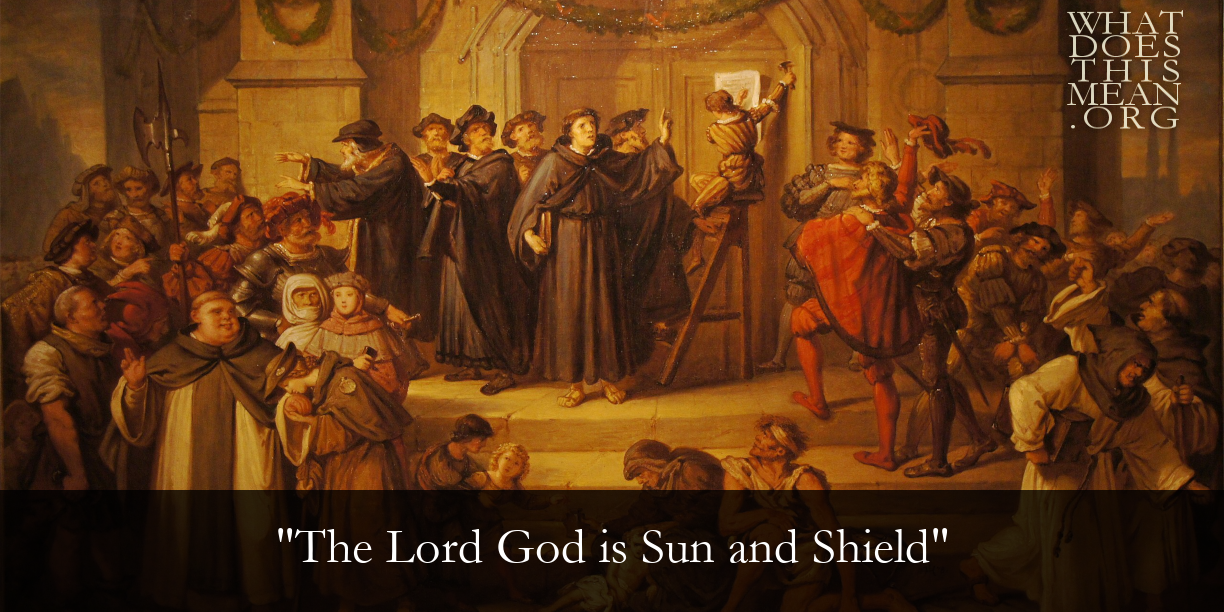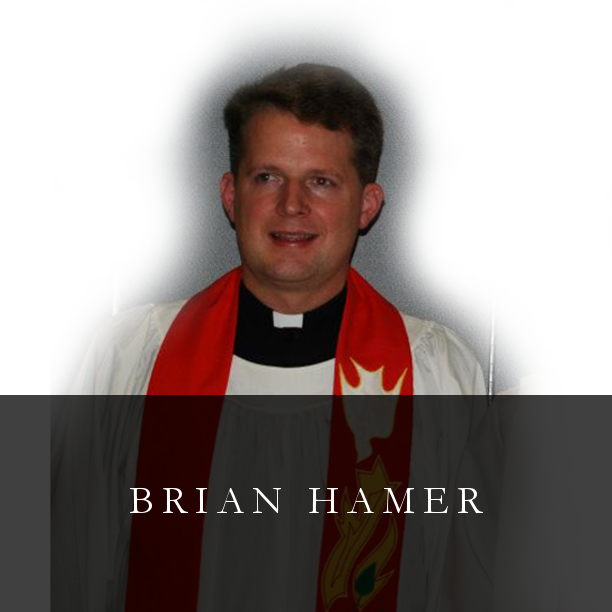no good thing will He withhold from them that walk uprightly.
With these lessons fresh in their ears and upon their hearts, the sons of the Reformation in Leipzig heard Cantata 79 as a sung sermon on the biblical texts. It begins with a quote from Psalm 84, which Luther described as “a psalm of comfort [that] praises God’s Word highly over all things and exhorts us to gladly give up all good things—glory, power, joy, and whatever we deserve—that we may hold onto God’s Word” (Reading the Psalms with Luther, p. 200). The opening chorus is truly splendid, an impressive sinfonia or prelude in A-B-A’ form. The first section is characterized by “a triumphal theme for obligato horns undergirded by insistent repeated notes on the timpani, perhaps depicting Luther’s hammering [of the 95 Theses]” (Robin A. Leaver, Oxford Composer Companions: J. S. Bach, p. 194). After a brief fugue, the voices enter and introduce the text from Psalm 84. “It is an extremely powerful movement with few rivals among Bach’s other cantatas” (Leaver, Composer Companions, p. 194).
The second movement paraphrases the same psalm verse used in the opening movement. The third movement employs one stanza of the hymn, “Nun danket alle Gott” by Martin Rinckart (1586–1649), who sang as a chorister in St. Thomas Church in Leipzig in the early 1600s. Especially notable is how the audience in this performance (it would have been the congregation in Leipzig) joins to sing the chorale, a practice which probably reflects an unwritten but important custom in Bach’s Leipzig. Listen to how Bach accompanies and paints the melody with the same obbligato horn theme from the first movement, lending a thematic unity to the first three movements.
The fourth movement, a brief recitative, leads naturally into a soprano and bass duet. Their prayer for God’s continued faithfulness is accompanied by octave leaps in the violins. The concluding chorale is a simple four-part setting of a single hymn stanza, with yet another prominent role for the horns.
Now grab a cup of Arabian coffee (Leipzig’s first coffee house was, after all, named “The Arabian Coffee Tree”), follow the text closely, and enjoy the historically informed performance of the St. Thomas Choir of Leipzig, which Bach himself conducted from 1723 until his death in 1750.
| 1. Chorus (00:03) Gott der Herr ist Sonn und Schild. Der Herr gibt Gnade und Ehre, er wird kein Gutes mangeln lassen den Frommen. (Psalm 84:11) 2. Alto Aria (05:01) Gott ist unsre Sonn und Schild! Darum rühmet dessen Güte Unser dankbares Gemüte, Die er für sein Häuflein hegt. Denn er will uns ferner schützen, Ob die Feinde Pfeile schnitzen Und ein Lästerhund gleich billt. 3. Chorale (08:31) Nun danket alle Gott Mit Herzen, Mund und Händen, Der große Dinge tut An uns und allen Enden, Der uns von Mutterleib Und Kindesbeinen an Unzählig viel zugut Und noch itzund getan. 4. Bass Recitative (10:36) Gottlob, wir wissen Den rechten Weg zur Seligkeit; Denn, Jesu, du hast ihn uns durch dein Wort gewiesen, Drum bleibt dein Name jederzeit gepriesen. Weil aber viele noch Zu dieser Zeit An fremdem Joch Aus Blindheit ziehen müssen, Ach! so erbarme dich Auch ihrer gnädiglich, Daß sie den rechten Weg erkennen Und dich bloß ihren Mittler nennen. 5. Aria (Duet) Soprano and Bass (11:31) Gott, ach Gott, verlaß die Deinen Nimmermehr! Laß dein Wort uns helle scheinen; Obgleich sehr Wider uns die Feinde toben, So soll unser Mund dich loben. 6. Chorale (15:03) Erhalt uns in der Wahrheit, Gib ewigliche Freiheit, Zu preisen deinen Namen Durch Jesum Christum. Amen. | God the Lord is sun and shield. The Lord gives grace and honor, He will allow no good to be lacking from the righteous. God is our sun and shield! Therefore this goodness shall be praised by our grateful heart, which He protects like His little flock. For He will protect us from now on, although the enemy sharpens his arrows and a vicious hound already barks. Now let everyone thank God with hearts, mouths, and hands, Who does great things for us and to all ends, Who has done for us from our mother's wombs and childhood on many uncountable good things and does so still today. Praise God, we know the right way to blessedness; for, Jesus, You have revealed it to us through Your word, therefore Your name shall be praised for all time. Since, however, many yet at this time must labor under a foreign yoke out of blindness, ah! then have mercy also on them graciously, so that they recognize the right way and simply call You their Intercessor. God, ah God, abandon Your own ones never again! Let Your word shine brightly for us; although harshly against us the enemy rages, yet our mouths shall praise You. Uphold us in the truth, grant eternal freedom, to praise Your name through Jesus Christ. Amen. |
Rinckart served as Archdeacon in Eilenburg from 1617 until 1649, years of service that are nearly identical to the span of the Thirty Year’s War (1618–1648). In addition to the war, this area suffered a great plague in 1637, leading to the exodus of many clergy, and the death of thousands, including Rinckart’s own wife. He officiated at over 4,000 funerals during the plague, including one mass burial for fifty people at once. The plague was followed by extreme famine, during which Rinckart gave away everything but the barest scraps of food that he saved for his family. In 1639, Swedish troops threatened his home town and demanded a massive financial payment in exchange for protection. Rinckart led many citizens in prayer and singing before the soldiers. Their commander was so touched that he reduced the financial demand by more than ninety percent. (Chronology adapted from Lutheran Service Book Companion to the Hymns 1:1418)
Through these remarkable hardships, see how this faithful son of the Reformation was not crushed, for the Lord God was his sun and shield, his grace and glory! His stalwart faith is evident in the inscription on his signet ring: MVSICA (“U” was commonly rendered “V” in early German printings). That a hymn writer would carry a ring with ‘music’ inscribed on it is no surprise (Rinckart held the musical office of kantor before being installed as Archdeacon). Rinckart, however, explained it as an acronym with even deeper meaning: “Mein Vertrauen Steht In Christo Allein” (“my trust is in Christ alone”). “Now Thank we All Our God,” his most enduring hymn, remains a fitting tribute to the faith of those who continue to give thanks for Martin Luther’s Reformation, even while the enemy rages:
All praise and thanks to God
The Father now be given,
The Son, and Him who reigns
With them in highest heaven,
The one eternal God,
Whom earth and heav’n adore;
For thus it was, is now,
And shall be evermore. (Lutheran Service Book 895.3)



 RSS Feed
RSS Feed
